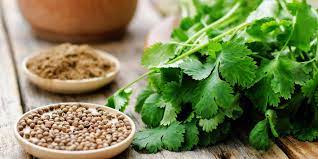
Coriander, also known as cilantro, is a versatile herb that has been cherished not only for its culinary delights but also for its health benefits. In this installment of our Ancient Wisdom series, we explore how coriander can help lower cholesterol and provide tips on incorporating it into your diet.
Coriander: A Kitchen Essential
- Coriander, also known as dhaniya in India, is a staple flavoring agent in most Indian kitchens.
- It is valued not only for its unique taste but also for its potential health benefits.
Managing Bad Cholesterol with Coriander
- High levels of bad cholesterol (LDL) are linked to various chronic diseases, including heart disease and hypertension.
- Coriander contains compounds that may help lower LDL cholesterol levels when included as part of a balanced diet.
- These cholesterol-lowering properties are attributed to coriander’s fiber content and plant compounds like flavonoids.
Ways to Add Coriander to Your Diet
- Coriander leaves and seeds are both used in cooking and offer distinct flavors.
- Here are some simple ways to incorporate coriander into your daily meals:
- Coriander Leaves: Add freshly chopped coriander leaves as a garnish to salads, soups, and curries for a burst of flavor and nutrition.
- Coriander Seeds: Crush or grind coriander seeds and use them as a spice in various dishes, such as stir-fries and marinades.
- Coriander Chutney: Prepare a coriander chutney by blending coriander leaves, green chilies, and other seasonings. Use it as a condiment for snacks or as a dip.
- Coriander Tea: Make coriander tea by boiling coriander seeds in water. This herbal infusion can be a soothing beverage with potential health benefits.
In Conclusion
- Coriander is not just a culinary delight but also a valuable addition to your diet for potential cholesterol management.
- Incorporating coriander into your meals can be an enjoyable way to explore its health benefits.
- Remember to maintain a balanced diet and consult a healthcare professional for personalized guidance on managing cholesterol levels.
Disclaimer: This information is for educational purposes only and should not replace professional medical advice. If you have specific health concerns or conditions, consult a healthcare provider for guidance tailored to your needs.